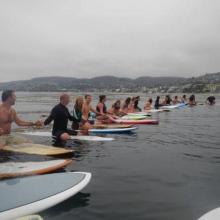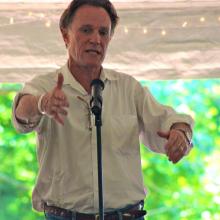Community
Editor's Note: God's Politics contributor, Nadia Bolz-Weber, recently delivered an address to the Evangelical Lutheran Church in America's (ELCA) Youth Gathering in New Orleans, where she told the story of her spiritual journey from tattooed, alcoholic ne'erdowell to tattooed, 20-years-sober, Lutheran minister. Nadia's is a powerful tale of redemption, God's unconditional love, and staggeringly real grace.
Nadia told the thousands of Lutheran youth gathered in the Big Easy earlier this month:
Some of your parents and some of your pastors were really upset that I was your speaker tonite. They felt like I was someone who should not be allowed to talk to tens of thousands of teenagers. And you know what I have to say to that? They are absolutely right.
Somebody with my past of alcoholism and drug abuse and promiscuity and lying and stealing should not be allowed to talk to you. You know what? Somebody with my present — who I am now — shouldn't be allowed to talk to you because I am sarcastic, heavily tattooed, I swear like a truck driver — they're having a heart attack back there, going, "Please help her not swear."
I am a flawed person. I should not be allowed to be here talking to you. But you know what? That's the God we're dealing with, people.
I want to point out three things, regarding Paul's analogy of the fruit of the Spirit.
1. It's not something we can acquire by simply trying harder. Throughout Galatians, Paul dismantles the idea that all God wants is for us to try harder, to do more things, to count on our achievements to gain right standing with God. The fruit of the Spirit comes when the Spirit is living in us.
To state the obvious: if you want an apple, you grow it. You plant the seed, you water it, you care for it, you allow for whatever factors you have no control over — weather, for example — and you trust and hope that, in the right time, the tree will spring up, it will blossom, and it will bear the fruit you’re looking for. It takes time and effort, and even then, we have no guarantee of what, where, when, or how something is going to appear.
Have you ever heard someone pray for patience now? It kind of misses the point of what patience is, doesn’t it? I definitely think we should be praying for these things, but don’t expect them to be just placed in your lap — “Here’s the love for your neighbor you requested!" Absolutely, there are times when God pours out a supernatural measure of peace or joy on us, but more often than not, instead of just giving us those things, God gives us opportunities to learn those things — love, joy, gentleness — and he gives us his Holy Spirit to be with us at all times, including those times, and the Spirit brings peace and joy in the midst of those things, so thatwe can cultivate the life framework to sustain it all, to grow a healthy soul, where we learn how to weave body, mind, and spirit into one cohesive whole.
The most amazing thing happened this week.
Maybe you missed it.
The Episcopal Church held their General Convention in Indianapolis, Indiana. They gathered. They prayed. They sang. I'm told there were a few sermons, too! And you know they offered the Eucharist. They can't do anything without someone bringing bread, wine, and a blessing. God love 'em.
This week they voted, too. They held up in their bicameral way of doing things and worked out some key issues. Among the issues at hand were whether or not to sell their offices in New York City and to find ways of investing their income in the future of the denomination. They did both. If you followed them on Twitter (Many did. #GC77 trended right up there!), then you know that there was hope and joy in their rooms. This is not why they made the news, of course. They made the news when they voted to formally allow for same-sex blessings within their communion.
Micah Bales asked a deep question. He suggests that the wealth in property we’ve inherited is hindering our work for social justice. He talks provocatively (as a spiritual challenge, he clarifies) about “burning the meetinghouse.” He asks, “What would happen if we put the movement of the Spirit ahead of property management?”
As I passed churches the other day I asked myself, “If there are so many churches in America, why does America look so unlike the Kingdom of God? Why are we strangers to our neighbors? Why do we have homeless poor among us? Why do sweatshops produce the majority of our goods? Why do we have the greatest per-capita incarceration rate in the world? Why are we choking the earth with fossil fuels?”
Many non-Christians lay the sins of our nation and even the world at the feet of the church. After all, a 77 percent of us self-identify as Christians (in 2009). So why is it that the Christian faith, the self-avowed enemy of greed, has allowed this world to happen?
I think that our churches have been slowly converted by the logic of the market, a logic which Paul called “the world.” Jesus called his disciples to disregard the economy, and later, in the midst of the Roman empire, the Acts church built centers of economic and spiritual wholeness that offered a concrete alternative to the mandatory emperor-worshipping cult which was physically represented by Caesar’s head on the golden coin: the money system. There was a prophetic imagination alive in the Acts church.
Learning to speak as a Christian is one of the most important and often ignored aspects of our discipleship. Nowhere is this fact more obvious than when churches try to talk about politics. When the small group leader makes a disparaging comment about Mitt Romney’s Mormon faith, or a car rolls into the church parking lot with a “NOBAMA” bumper sticker proudly displayed, what do we do?
Is bumper sticker propaganda and negativity the best we have to offer?
Admittedly it can be risky to talk about politics in the local church. All it takes is one idea or statement that flies in the face of someone’s deeply held convictions and that could be the end of our influence and the end of that person’s involvement in our ministry.
Still, the upcoming presidential election will be the defining cultural event of the next six months. If we completely ignore it we are missing a golden opportunity for discipleship.
How can churches have a healthy conversation about politics in the middle of a national election without demonizing the opposition and causing disunity?
I’ve been working on this question for months now, and as part of my preparation I wrote a book called Public Jesus. Here’s a little bit about what I’ve learned in the process:
1) Love the One You’re With
I have a confession.
(That's rich, right? A minister confessing.)
I have a hard time telling people I'm a minister. Yes, really. I actually tend to handle it this way:
Person: “So, what do you do for a living?”
Me: “I'm a minister... (appropriate pause)... but not the kind you just pictured in your head.”
Sad, I know.
Honestly though, it's worse than that. I'm even very resistant to calling myself a “Christian.” And I'm not even close to the only Christian who feels that way! It's so bad that I have this very conversation with people all the time. There seems to be some kind of “Believer-like-me Radar” which tells people it's safe to talk to me about not liking the“C” word — CHRISTIANITY.
The first wave wrenched the board loose from my fingertips, sending it crashing into my knee and knocking me off my feet.
“You OK, Cath?” I heard someone call from behind me.
“Not really!” I hollered, as someone reached around me to steady the huge stand-up paddle board while I struggled to regain my footing in the icy-cold waters of the Pacific.
My friends, experienced surfers Joel and Rob, appeared at my side, holding onto the board and gently coaching me to wait for the next set of waves to pass before attempting to paddle out toward Second Reef, several hundred yards beyond the shore break.
“You got it?” Rob said, “OK. You’re good to go!”
Gripping the long-handled paddle in one hand, I foisted myself forward (if with less grace than I had hoped) onto the board, while Joel pushed it forward into the momentarily glassy sea between sets.
The 2012 Wild Goose Festival East wrapped up just under a week ago and I am still trying to process my experience there. As I tweeted as I drove away from the fest, I left feeling exhausted, hopeful, and blessed – that strange combination that reflected the emotional impact of my time there. And it was a truly blessed time.
I was honored with the opportunity to speak on The Hunger Games and the Gospel as well as do a Q&A on everyday justice issues at the Likewise tent. I also was able to join Brett Webb-Mitchell on a panel discussion about living with disabilities in religious communities.
But beyond those conversations I was able to help initiate, I also found a generous and safe space to connect with friends, wrestle with difficult questions, and dream of a better world. Such spaces are so rare in my life these days, that finding such at Wild Goose was a precious gift.
There are, of course, the expected complaints about the festival. It was brutally hot (and that is coming from a Texan). I never ceased to be sticky, sweaty, and stinky and there were bugs everywhere. Camping in a field where every action (and parenting attempt) is on constant display is stressful and uncomfortable. And, as with many religious gatherings, there could have been greater diversity.
For the first hour I was there as I nearly passed out trying to set up a tent in the sweltering heat, I was in a panic mode wondering why I was stupid enough to subject myself to the discomfort and imperfection of it all again this year. Yet as I entered into the experience of being a part of this crazy wonderful gathering, those issues (although ever-present) faded in significance as I found myself fitting into a place where I felt I belonged.
1) Tune in. Log off. Let go.
Darting fireflies supplied most of the light that pierced the rural darkness when I arrived at the Wild Goose Festival site on a farm in Shakori Hills, N.C., late last Wednesday night. I left my ballast — a huge duffel bag containing a pup tent and enough bug spray to cover a small village, a suitcase full of mostly tie-dyed clothing, a large computer case and a camera bag — in the 15-person van that had spirited me from the Raleigh-Durham airport to the farm about an hour away.
While I’m not exactly known for packing light when I travel, my unusually cumbersome luggage for the festival contained the various gadgets and gizmos that would allow me to work from my campsite on the farm — live blogging about the festival, complete with video, audio and photos, and the help of four Sojourners interns who were set to arrive Thursday afternoon.
I had barely stepped foot on the campground when I checked my smart phone to see if cell service and the festival’s WiFi were working. They were. Good, I thought. All set to work. It would be a hectic few days covering the festival’s numerous speakers and musical performances, but we’d get it done.
Ah, hubris. Humans make plans. God chuckles and says, “Oh, really?”
The Almighty, it would seem, had better ideas for how I should spend my time at Wild Goose, which takes its name from the Celtic metaphor for the Holy Spirit.
A few weeks ago I (an ordained minster who has gone to church my whole life) walked away from church — for three months. It is what I've decided to do with my sabbatical. You can read about my initial thoughts on my blog or on The Huffington Post. As the journey unfolds, I will be blogging about it in this series entitled, “Church No More.” I hope you will not only follow along, but add your voice to the reflection by commenting or joining the discussion on my FB page.
It might be that the thing which concerned me the most about leaving the church was losing my spiritual community. It's not that I thought the spiritual-but-not-religious folk were helplessly lonely people wandering around seeking a spiritual community. Not at all. I just assumed that it might be immensely difficult to find and plug into a community like that in the course of three months. I also couldn't help but think it would be just a bit — well, fake to seek out a community for the sake of observing them and then leaving a few months latter. Not just fake but somewhat mean spirited and completely missing the point of community.
Here's the thing, I am a minister. I understand myself to be a person who ministers by following the lead and teachings of Jesus. (I also happen to follow the teachings of many other spiritual and/or thought leaders from Buddha to Neil deGrasse Tyson, but that's for another post some other time). Because of that, the idea of life without a spiritual community gives me the heebie-jeebies. (I apologize for using such a technical term, but a duck is a duck is a duck).
SHAKORI HILLS, N.C. — On a swelteringly hot solstice weekend in the southeast, a couple thousand folks gathered in the woods of North Carolina to get their collective goose cooked. An early summer camp like no other, this second annual festival invokes a Celtic image of the Holy Spirit and sparks unlikely convergences inside the great emergence of the contemporary Christian counterculture.
The Goose blends the best of an intellectually engaged faith conference and social justice activist base camp with the sonic frivolity of a modern rock festival and stirs all concepts and collapses all constructs in a steamy potluck stew of primal camp meeting and postmodern tent revival. Without a doubt, the blossoming and beckoning of the Wild Goose movement in North America heralds a bright radical future for today’s Jesus followers bringing the kingdom come.
Wild Goose Festival: Sunday Call to Worship from cathleen falsani on Vimeo.
The second Wild Goose Festival has just ended. I left a piece of my heart in the hills of North Carolina. Ahead is the third WG fest at the end of August in Portland OR. And then there will be next year and the next... The White House sent the Rev. Derrick Harkins (faith outreach director for the Democratic National Committee) to observe and talk with some of us this year. So I guess WG got noticed.
Last year's WG was the first and there were about 1,300 of us there. This year we were closing in on 2000-plus. And now WG is West Coast bound too. The names of the speakers Jim Wallis and all the rest (I spoke 3 times) added up to a "draw" along with the big name musical performers. But the heart of the festival wasn't in the events but in the conversations.
For me the highlight of the festival was the fact that there was no wall of separation between us speakers and performers and everyone there. I spent 4 days talking with lots of people from all over America and other places too, about ideas but also about very personal subjects. I met Ramona who was the cook at the Indian food stand and found she is ill and has no health insurance and I was able to connect her with a friend who knew a friend at the WG fest locally to help her get the full checkup she needs. I could do that because the festival was full of the sort of people who help, love and care so for once there was someone to call.
And I watched the sneak preview of the movie Hellbound that will be released this fall. It happens that I'm one of the people interviewed in the movie but that's not why I say it is one of the best films I've ever seen. We watched it at 11 PM and talked until 2 AM. People were just stunned.
I have been discovering more each day how much I love Muslim people. They are beautiful, warm people, yet we are afraid of them because of misconceptions based on our stereotypes of their race.
I have friends who were living in the Middle East for four years and were sharing about how amazing they find Muslim people. Through my own encounters and my friend’s experiences, here’s what muslim people have taught me.
I'm rewriting the old African-American spiritual “Down By the Riverside.”
(Don't worry. It's OK . I'm a minister).
My new version goes something like this:
Gonna lay down my robe and stole
Down by the Riverside
Down by the Riverside
Down by the Riverside
Gonna lay down my robe and stole
Down by the Riverside
Ain't goin' to church no more.
Yep! That's it. This minister is walking away from church — well, at least for the next three months.
 It started with a few pieces of construction paper.
It started with a few pieces of construction paper.
If you’ve been following my blog at all over the past few months, you know that Amy and I recently moved our family from Southern Colorado, where we planted a church eight years ago, to Portland, Oregon. Though we’re still doing ministry, it’s a completely different kind of work. Now we’re at a 133-year-old church in the heart of the city. The facility is incredible and the history of the church spans generations. But with that comes a good deal more administrative work than either of us is used to.
We found a preschool for Zoe right away. In fact, the first day she told us that we needed to leave and let her do her school thing. She’s the kind of kid who blooms wherever she’s planted. Mattias, our eight-year-old son, is a little more complicated. Aside from him having Asperger’s, the schools here don’t get out for a couple of weeks yet. This means not only that he has no other kids his age to play with, but also that the typical summer activities we could enroll him in don’t start until mid-June. The result: he gets to spend some pretty long days with us at the church.
Most times, he makes the best of it. He’s figured out how to navigate the labyrinthine halls by scooter, and he has plowed through more cartoons on the iPad than is healthy, I’m sure. But we have to work and we have no other options for him. So far, we’ve all managed.
But yesterday afternoon, he’d had enough. He looked up from his chair on the other side of Amy’s desk with tears filling his eyes. “Mom,” he said quietly, “I’m so bored.” There are plenty of adjectives that describe Mattias, but quiet isn’t one of them. So you know when his voice reduces to a whisper, he is really being sincere.
Amy came down and stuck her head around the corner into my office. “We’re going across the street to throw paper airplanes in the park, she said. “want to come?”
Image by Feng Yu/Shutterstock.
Ah, the life of the church. So many arguments, so little time.
The list of subjects about which the saints disagree is seemingly endless, encompassing both the profound and the woefully mundane.
The ordination of women. The proper role of religion in politics. Climate change. Homosexuality and same-sex unions. Pre-, Post-, or A-millennialism. Biblical translation. Gender pronouns for God. How best to aid the poorest of the poor. How best to support the sanctity of marriage. Hell. Heaven. Baptism. Which brand of fair-trade coffee to serve in the fellowship hall. The use of “trespass/es” or “debts/debtors” in reciting the Lord’s Prayer. Whether to use wafers, pita, home-baked organic wheat, gluten-free or bagels at the communion table. What color to paint the narthex.
It should come as no surprise to most Christians that the world outside the church looking in sees it rife with conflict, bickering, arguments and castigation — of the “unbeliever” and fellow believers alike.
Frankly, it also should come as no surprise to the rest of the world that the church — by virtue of being a community of humans — naturally would have such disagreements and discord.
Being vulnerable isn’t easy. I think it would be easier to stand outside naked for a moment of mocking than to unveil the inner-self to others for a lifetime of judgment. However, I recently heard theTED Talk below by Brene Brown on her years of study on the subject of vulnerability.
What she discovered moved me to the core.
Brene states that in order for us to connect we have to allow ourselves to be SEEN. This is scary for the shy and the outspoken because we all think the same thing — “Is there something about me that if people knew they would withdraw?”.
Every soul cries: “Am I worthy of connection?” We then allow the mass public to tell us the answer to that. Please note: that unstable analysis can never end well no matter how popular one may seem. This leads us to live in shame of who we are in which Brown describes shame as “the fear of connection.”
I believe I can state truthfully that we live in a world of people full of shame. We’re scared to death of each other!
Paul Simon says there must be 50 ways to leave your lover. The Naked Pastor figures there must be at least three ways to leave your church.
I am a bubbly extrovert who struggles with an enormous amount of anxiety when meeting new people.
Sounds like an oxymoron doesn’t it?
This weekend, I ventured down to Chicago to meet a group of women I’ve been in relationship with via Internet for more than a year. Let’s just break that down for a minute:
- a group of women
- a group of women I’m meeting for the first time… alone
- a group of women who have a preconceived notion of who I am based on good pictures and thought-out witty comments I post online.













